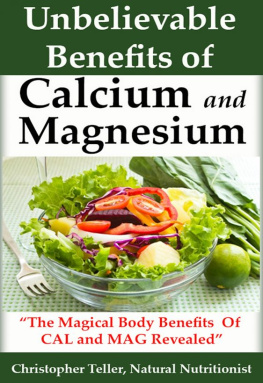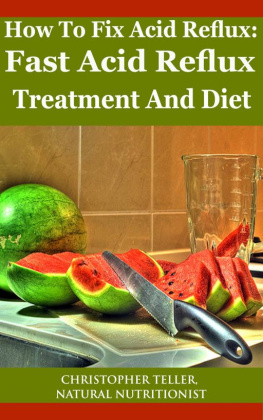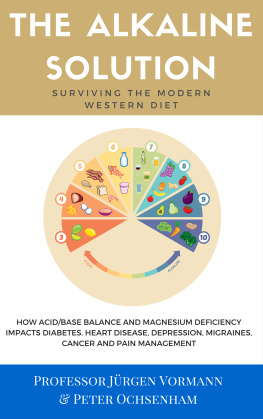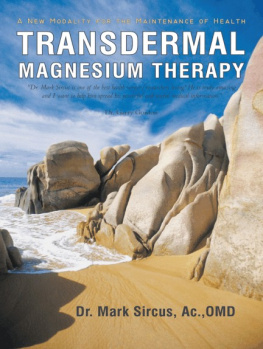Calcium and Magnesium:
The Magical Body Benefits of Calcium and Magnesium Revealed
Christopher Teller, NaturalNutritionist
Smashwords Edition
Copyright 2013
All Rights Reserved.
No part of this publication may be reproducedin any form or by any means, including scanning, photocopying, orotherwise without prior written permission of the copyrightholder.
Introduction:
Importance of Calcium in Your Body
Calcium occurs in the earth as limestone,calcium carbonate, as gypsum, or as apatite. It is always foundcombined with other elements. You will never find a pure calciumrock.
When these types of calcium compounds combinewith water, they dissolve and form an alkaline solution. This isone of the reasons why you want to know as much about calcium,since it is one of the main elements that can make your bodyliquids alkaline.
One of the most important health programs youneed to pursue is to move your body from an acid condition into analkaline condition and calcium helps you do this.
When your body is maintained consistently inan acid condition, calcium is also consistently removed from yourbones, which results in porous bones, or from tissue or organscausing degradation of those areas.
Calcium is the most abundant of the mineralsin your body and it makes up 1.6% of your body weight or represents40% of all of the minerals in your body. But, 99% of the calciumyou have is located in your bones. The other 1% is distributedthroughout your body, and its involved in numerous structural andbiochemical processes throughout your body.
Bone Loss
Bone loss starts around middle age. For womenit increases during menopause. For men, bone loss is slow butsteady starting from around 30. In bone loss there are normally nosymptoms. But here are a few that stand out:
Bone deformity or rickets
Muscle and leg cramps
Insomnia
Growth retardation
Unfortunately, around 40% of women who liveover 75 years will experience bone loss factures. Here are somereasons for low bone mass at any age.
Diet that lacks daily use of fruits andvegetables
Slender body or low weight
Premature menopause
Anorexia nervosa
Extreme athletic training
Lack of exercise or a sedentary lifestyle
Excess eating or using various types of meator protein, phosphorus, sodium, caffeine, wheat bran, andalcohol
Smoking
Excess use of sodas
Use of corticosteroid medications
Prolong bed rest or confined to a wheelchair
It has been found that if you lack a smalldrop in the required level of calcium in your body this deficiencywill activate aging and many degenerative diseases. Even thoughcalcium is a large atom, it chemically moves 10,000 times fasterand is 10,000 times stronger than magnesium.
This gives calcium the ability to bindquickly and strongly with important biological molecules, whichsustain life. This chemical flexibility gives calcium the honor ofbeing called the King of the Bioelements.
In this kindle e-book, you will discover whyit has this name. Despite there is more calcium in the body thanany other mineral, with exception of oxygen, calcium is not moreimportant than the other minerals, since all work together and areneeded in your body for maintaining life.
What we can say about calcium is that it isinvolved in more biochemical activities in your body than any othermineral, so that it is important to supply your body with a goodamount of calcium. Your body will eliminate the excess calcium fromyour body as its natural behavior, even when it is in a supersaturated form in your body liquids.
But when there is a deficiency of otherminerals in your body that must balance with calcium, like sodium,excess calcium can react un-naturally, causing calcium crystallinedeposits, which lead to pain and disease.
When your body lacks calcium and has weak orporous bones, calcium will deposit calcium crystalline stones invarious places in your body as it tries to build up weak bones. Amisconception is that if you have calcium deposits in the joints ortissue giving you pain, that you have too much calcium.
The truth is you do not have enough calcium,so the body tries to compensate for this by calcium deposit tobuild your bones back up.
Calcium is found in your blood, bonestructure, tissue, muscles, lymph liquid, and in every body cell inyour body. It is found in the lymph liquid outside and inside yourcells. In the so called Sodium Potassium Pump the mineral sodiummoves out of the cell and moves potassium into the cell. When theinside of the cell has mostly potassium, the electrical chargeinside the cell is less than the charge outside of the cell wheresodium dominates. This condition attracts calcium to carry foodnutrients into the cell and to perform in the cells variousbiochemical and bioelectrical reactions.
Calcium ions also play a major role in nervestimulations and transmissions, muscle contractions and movements,and organ hormone secretions and many other biological functions.It is involved with your bodys enzymes to produce energy.
Calcium ionic concentrations are the mostregulated mineral in your blood plasma. Its ionic form is Ca++ andin this form its most important function is in nerve function. Fornerve function, calcium keeps your nerves receptive to sodium ionswhich help to transmit brain impulses and information to variousparts of the body, which regulate your bodys activities.
In those cultures where drinking water had ahigh content of calcium, it was found that peoples life span was10 years or more than in western countries.
Kidneys
Your kidneys act as filters for your bloodand they remove those nutrients or chemicals that your body nolonger needs from your blood and this includes calcium. Excesscalcium is routed to your bladder where it is expelled in yoururine. If calcium is still needed, your kidneys will pass it intoyour blood to be reused by your body.
Most minerals and vitamins combine and reactwith calcium to produce the various body structures and chemicalsthat make up your body.
It was thought at one time that if youproduced kidney stones that you needed to take less calcium. If youtend to form kidney stones, you will have increased calcium in yoururine, but this is caused by your body pulling calcium out of yourbones.
Because eating excess meat cause your body toexcrete calcium it is recommended, for kidney stones, to eat lessmeat, increase the use of fruits and vegetables, and supplementwith calcium citrate, magnesium, vitamin B6 and vitamin C.
You can take calcium citrate on an emptystomach. Most other supplements, you should take with meals.
Calcium Toxicity
Usually, there is no calcium toxicity, evenwhen you take a large dose. There is some concern that people witha tendency toward kidney stones should avoid excess calcium, butthese concerns have not been proven. Kidney stones are more relatedto diet and those people who favor an acid diet tend to form kidneystones. In an acid diet, calcium is active and depleted as it isused up neutralizing body acids.
Chapter 1:
How Calcium Works Magic in your Body
Here is a list of some of the importantbiochemical and bioelectrical functions of calcium in the body:
Absorption of calcium
Activity in cell function
Maintaining an alkaline body
Contributing to Saliva alkaline body test
Needed Calcium foods
Adsorption of Calcium
Calcium is one of more difficult minerals todigest and to absorb through your intestinal walls. Variousphosphates and other compounds (Phosphates are derived fromphosphoric acid and when they combine with oxygen they become anorganic phosphates, which have important biochemical activities inyour body) found in red meat and sodas react with calcium to form acalcium phosphate precipitate. This prevents calcium from beingabsorbed and calcium is then excreted from your body.






